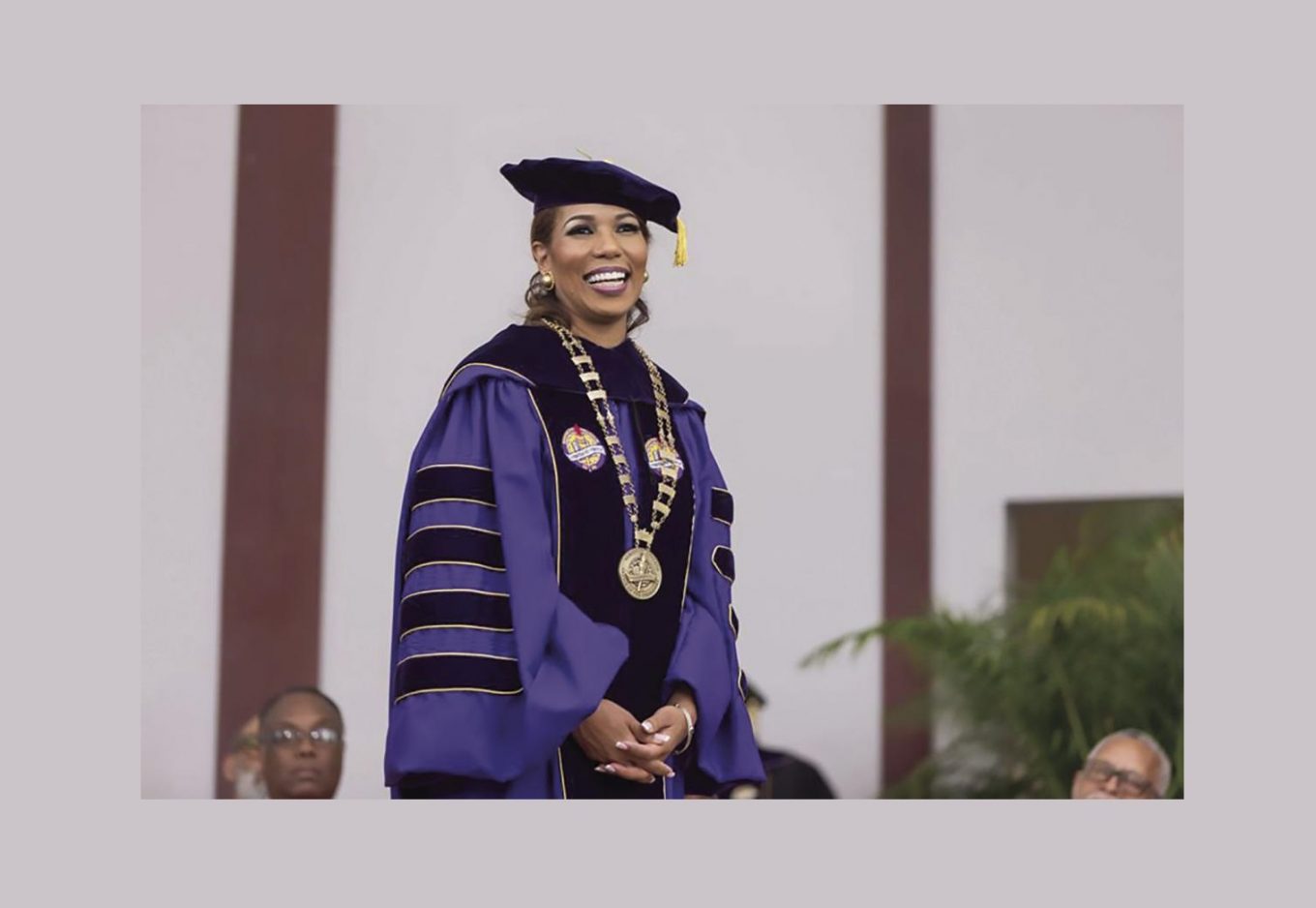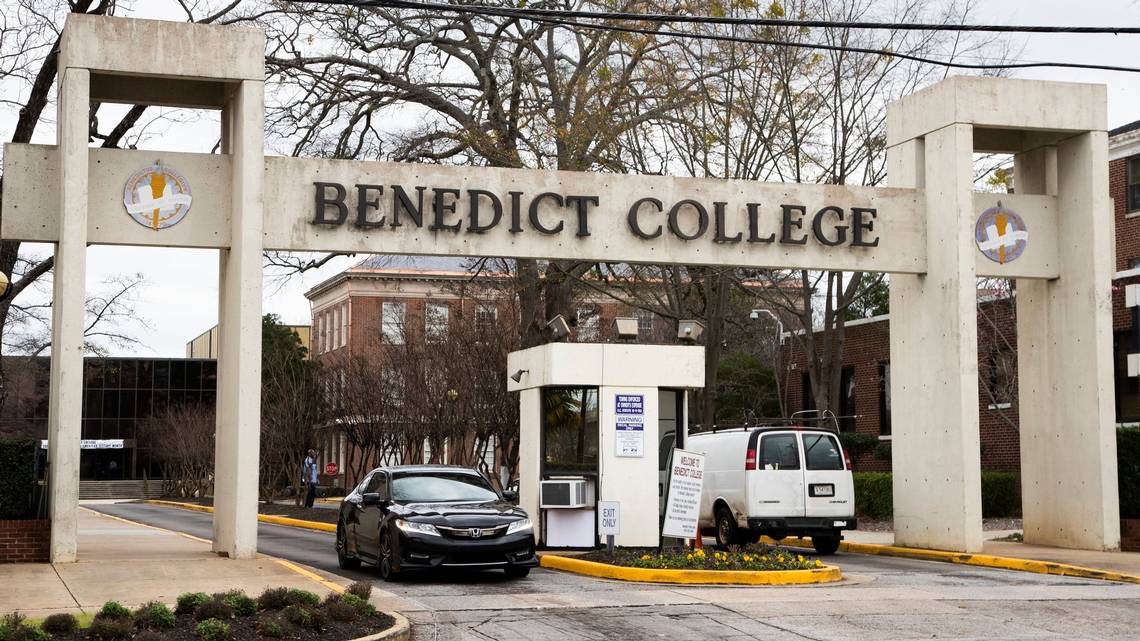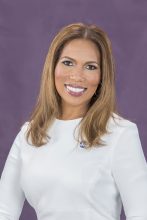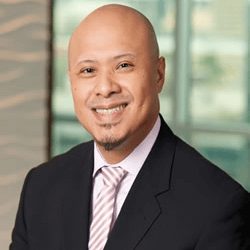
Dr. Roslyn Clark Artis has earned for the second time in history, the honor of serving as the first female President of a collegiate institution in the United States. On June 30, 2017, Dr. Artis was unanimously appointed by the Board of Trustees as the 14th President of Benedict College. She is the first female President in the 147-year history of the College which was founded by a woman, Mrs. Bathsheba Benedict in 1870 and celebrates its 150th Anniversary this year.
Intentional, professional, and thoroughly committed to the proliferation and transformation of colleges and universities that serve underrepresented men and women of color, Dr. Artis brings to Benedict College a depth of knowledge in higher education and an enthusiasm for students’ success that is unmatched in today’s higher education arena. In March 2019, Dr. Artis was named Diverse: Issues in Higher Education’s Top 35 Leading Women in Higher Education, the annual recognition honors the contributions of women who stand out for their ability to forge solutions to the unprecedented challenges facing the nation’s higher education community.
Dr. Artis is a graduate of Vanderbilt University, where she earned a Doctorate in Higher Education Leadership and Policy. She also holds a Juris Doctorate from West Virginia University College of Law, and her Bachelor of Arts degree in Political Science from sister HBCU, West Virginia State University. The consummate professional, Dr. Artis also holds a Certificate of Fundraising Management from Indiana University and a Certificate of Mastery in Prior Learning Assessment from DePaul University.
Emad Rahim: Please tell us how your career as president of Benedict College began.
Roslyn Clark Artis: I came to Benedict College after having served as the 13th and 1st female President of sister-HBCU, Florida Memorial University in Miami Gardens, Florida. Both Florida Memorial University and Benedict College are mid-sized private, Historically Black Colleges that are affiliated with the Baptist church.
As a graduate of an HBCU (West Virginia State College/University), I have a profound commitment to the transformative power of an HBCU education. Though my pathway to the presidency was a non-traditional one, having practiced law for ten (10) years prior to beginning my career in higher education, I am confident that my HBCU prepared me well for the rigors of higher education leadership.
E.R: What is your leadership style and how has it evolved during your presidency?
R.C.A: My leadership style can best be characterized as “informed and decisive.” My decision-making process typically begins with extensive collaboration between and among institutional constituents and stakeholders to ascertain their opinions, ideas and perspectives. When I am satisfied that I have the appropriate information and perspective, I make and clearly communicate my decision. While time and opportunity for consensus often varies, I try to be inclusive and collaborative.
Now, in my eighth year as a College/University President, I have become more adept at filtering information and my professional experience has added significant dimension to my decision-making. In short, I have become more confident and decidedly decisive.
E.R: What is the mission of Benedict College and what makes your institution unique?
R.C.A: Benedict College’s mission is to provide transformative learning experiences, characterized by high quality academic, co-curricular and extra-curricular programming, intentionally designed to develop superior cultural and professional competencies for a diverse student body.
The college recognizes that teaching and learning occur both within and outside the classroom. Benedict combines extra-curricular and co-curricular activities and experiences that are thoughtfully curated to enhance student learning and to develop students’ abilities as critical thinkers. Perhaps most important, the College provides these educational experiences within the context of a culturally sensitive environment.
In my mind, Benedict’s mission is to educate and inspire its students, engage its stakeholders, and positively impact the world.

E.R: How is the college addressing campus safety and academic accessibility during a global pandemic?
R.C.A: Benedict College has prioritized the health and safety of our students, staff and faculty first and foremost. Its comprehensive re-opening plan includes universal, mandatory Covid-19 testing, social distancing, face coverings, a midnight curfew and a host of other safety measures. Each of these strategies is intentionally designed and executed to prevent the introduction and spread of Covid-19.
As it relates to accessibility, the College has worked diligently to provide access to each of its students regardless of whether the students returned to the campus or remained in a virtual format. Laptops, hotspots and other forms of emergency aid have been provided through the Office of Student Success. In addition to support for academics, including tutoring, the College has provided access to social and emotional support in the form of counseling and outreach.
E.R: With more universities going online, what type of innitiatives are you doing to set your programs apart?
R.C.A: In response to Covid-19, the College transitioned all its courses into online and hybrid format. The College took the additional and rare extra step of converting to a “textbookless” environment. Faculty worked diligently to identify and embed open-source materials in each of it courses. These resources not only resulted in a significant cost savings for the students, but these materials are generally more current, relevant and engaging for the 21st century student.
In addition, the College extended its tutoring services to students operating at a distance as well as its library resources. The College expanded its digital holdings and committed to a full-service circulation effort for students in need to hard copy resources.
E.R: Where do you see your college going in the next five years given all of the challenges and changes that higher education is facing around the world?
R.C.A: Benedict College has embarked on a remarkable transformation, characterized by academic achievement and innovation. In the next five years, Benedict College will expand its Business Development Center and Women’s Business Center – both of which exist to engage and support minority business and innovation. Additionally, the College will continue the expansion of its offerings in-demand disciplines like cybersecurity, environmental engineering, and computer sciences.
Benedict is equally committed to continuing its history of producing powers for good in society through its teaching, social work and criminal justice programs. Its burgeoning Center for Racial Reconciliation will have expanded to reflect its national prominence. The center will explore and drive policy around critical social issues, including criminal justice reform, educational and health equity.
Beyond its academic programs, Benedict will continue to produce athletic champions, community servants, brilliant artists, and talented musicians. Finally, and perhaps most important, Benedict will continue to embrace its Baptist faith while welcoming students from all walks of life, races, creeds, colors, religions and sexual orientation.
More Higher Ed thought leadership Series Interviews
Emad Rahim Interviews Dr. Mary Hawkins, President of Bellevue University
Emad Rahim Interviews Merodie A. Hancock, PhD President, Thomas Edison State University
E.R: Given the Black Lives Matter movement, protests and rallies against racism and police brutality happening across our nation, do institutions like Benedict College have a responsibility in addressing these society issues?
R.C.A: Higher education and more specifically, Historically Black Colleges, have a responsibility to engage in, and in fact, facilitate complex, critical and difficult conversations around race and social justice in America. Our students study on a campus that affords them the opportunity to speak freely about issues of concern to them as people of color. However, much more important than that, our students are given tools to unpack complex social issues and contribute in meaningful ways to policy conversations around equity and justice. Finally, and perhaps most important, HBCUs, which were born of exclusion, have never practiced exclusion – all students are welcomed on these historic campuses – stand as beacons for equity and diversity in an increasingly divided country.
Faculty play a critical role in the development of your students’ learning and in helping to build their professional competencies. What type of things are your faculty involved in or doing that makes their classroom unique to their learning experience?
Benedict faculty continue to be on the cutting edge. Students are encouraged to participate in undergraduate research opportunities, led by faculty who are distinguished scholars and researchers. Additionally, faculty escort students on global learning experiences and conduct extensive corporate and community outreach in order to facilitate meaningful internship opportunities for students.
Perhaps more important that their teaching and research, Benedict faculty serve their students outside the classroom as passionately as they engaged them in the context of their teaching. They consistently make themselves available to tutor, guide, advise and support student success.

E.R: What type of qualifications and experiences do your faculty bring to the class? How do you make sure they stay updated in their area of expertise and field of study?
R.C.A: Benedict faculty bring a unique combination of academic and professional experiences to the classroom. The Office of Academic Affairs consistently encourages, and more importantly, supports a robust menu of faculty development activities, including the active pursuit of the scholarship of teaching and learning. Most recently, the Center for Teaching and Learning has focused on providing professional development opportunities for faculty related to online pedagogy and student engagement.
E.R: Many of our subscribers are new leaders in higher education or aspiring to become a university administrator, what recommendations or advice would you give them as they move forward in their careers?
R.C.A: Study, prepare and pray. Distinguish yourself at each stage in your career – live in the moment and master your craft. Find mentors and accept their mentorship. Practice patience. Learn to listen. Think critically and dream big.
This is the most important work that you can do. Education remains the greatest pathway to equity in this country. A commitment to education is a commitment to the future and there is no higher calling.
Read More:

Dr. Emad Rahim is an award-winning entrepreneur, educator, author, community leader and TEDx Speaker. He currently serve as the Endowed Entrepreneur-in-Residence at Oklahoma State University and teaches at the Jack Welch Management Institute in the Executive MBA program. He was recognized by the United Nations Foundation as a 2013 Empact100 Honoree for his social entrepreneurship work, received a Congressional Award for his community service and was the recipient of the Forty Under 40 Business Leadership Award sponsored by Syracuse University. His personal story was turned into a short documentary, “Against the Odds,” and featured in the Huffington Post and Forbes. He co-authored “Leading Through Diversity: Transforming Managers Into Effective Leaders” and “The 4-Tions: Your Guide to Developing Successful Job Search Strategies” and is a frequent contributor to the Refractive Thinker book series, CEO Magazine, TweakYourBiz and YFS Entrepreneurship Magazine. Fellow him on Twitter @DrEmadRahim


























